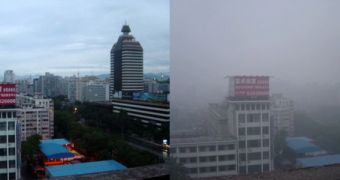Completely taken aback by the massive success they registered with cleaning Beijing's air during the 2008 Olympic Games, authorities in the Chinese capital have now recovered, and are moving towards extending the exemplary accomplishment around the country. The Communist government has for a long time stated that it would engage actively in reducing the amount of pollution the nation gives off, if only other developed nations such as India, Australia, the United States and Germany would do the same. Now however, they are looking at ways of reducing the massive amounts of smog covering their major cities, and also at how they could reduce the size of the smoke cloud covering the continent.
“We can see that there are many areas we still have to work hard on. One important area is not ceasing to strengthen laws and regulations; we must use the law to combat pollution. This is something for the local as well as central government,” said Du Shaozhong, the deputy head of the Beijing Environmental Protection Bureau. He was speaking recently to a group of journalists, while taking them on tour to one of the Chinese capital's air quality monitoring stations, Reuters informs.
While authorities indeed said that air quality had improved over the time frame in which the Olympics took place, which is somewhat true, air monitoring stations set up by the American embassy have proven that a distinct threat comes from pollutants that the Chinese government doesn't even monitor, and doesn't take into account when creating reports on the amounts of pollution in the air. “At the national level they have plans to do the revision, but because it is the national level it is not our work,” added an environmental bureau official, under the protection of anonymity.
Ozone and fine particulate matter (PM 2.5) are two of the main pollutants that China is heavily criticized for not taking into account when assessing the amount of pollution in the country's air. “When it comes to ozone and PM 2.5, from what I understand the country is currently positively researching pollution standards, and I hope this is the future trend of our control and monitoring activities,” the official added.

 14 DAY TRIAL //
14 DAY TRIAL //